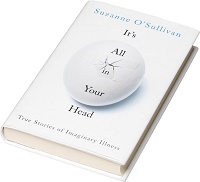Christians have never been empiricists, only accepting what can be seen or touched or measured. A review of Suzanne O'Sullivan's book 'It’s All in Your Head: True Stories of Imaginary Illness'.
It’s All in Your Head: True Stories of Imaginary Illness
By Suzanne O’Sullivan
Random House, 2015
Yvonne is blind. Camilla suffers debilitating seizures. So does Pauline. Matthew exhibits many of the life-limiting and degenerative symptoms of Multiple Sclerosis, and Shahina’s hand is clamped shut.
All of them at one time have been referred to Suzanne O’Sullivan, consultant in clinical neurophysiology and neurology at the National Hospital for Neurology and Neurosurgery in London; and none of them have any medical reason for their symptoms. It’s All in Your Head, winner of the 2016 Wellcome Prize, is the book of their stories.
The title is misleading. Whilst tabloid-like it grabs the attention, it actually says something very different from O’Sullivan’s nuanced and compassionate narrative. Weaving the case studies of Yvonne, Camilla, Pauline and others, together with medical history and her own journey as a doctor, O’Sullivan argues that psychosomatic illness is real, serious and physical.
Throughout the writing we catch glimpses of O’Sullivan’s concern for her patients. She has interrupted sleep; she winces as a patient experiences pain; in one case she writes, “the sight of her alone caused a hollow feeling inside of me that I did not fully understand”. And by doing so, she not only makes herself seem a caring narrator, the kind of doctor we would all want to see, but she also illustrates her own thesis: we all experience physical sensations brought about by emotion and stress. It should be no surprise then that around 30 per cent of patients visiting their family doctor have symptoms which cannot be medically explained. The chronic cases documented here are the extreme end of that wedge, arriving in O’Sullivan’s consulting room after months, even years of hospital investigations and explorations.
 Cover of the book.
Cover of the book.Some of them have experienced trauma, maybe years before the symptoms appeared, others have a family member with catastrophic illness (it is reported that the relatives of brain-tumour patients are sometimes struck with crippling, inexplicable headaches), others again have a generalised anxiety which makes them listen to their body for the slightest ache or pain, turning to Google to feed their fears and thereby multiplying the symptoms.
The illnesses are as varied as the patients, and the problem is nothing new. We hear about attempts throughout history, from Hippocrates to Freud and beyond, to connect mind and body and to explain what was called for centuries, hysteria. And still now, though knowing what can help (support, talking therapies and ignoring symptoms) O’Sullivan admits that the processes of cause and effect are largely unknown. For all the attempts of our age to taxonomise and medicalise mental distress, we are left with great mysteries of personhood and consciousness, as Gerard Manley Hopkins so powerfully wrote:
“O, the mind, the mind has mountains; cliffs of fall
frightful sheer, no-man-fathomed. Hold them cheap
May who ne’er hung there.”
And this should be something that Christians can understand. We’ve never been empiricists, only accepting what can be seen or touched or measured. We’re also not determinists, believing that one action will always result in a certain reaction. Suzanne O’Sullivan’s observations echo in some way what the Bible teaches us about the individuality and vulnerability of every person; about our need to believe in a story; about the created integration of our minds and bodies; and about our willingness to hold on to what may cause us hurt.
O’Sullivan makes us see the real pain these patients live with and the great difficulty for patient and doctor of reaching a psychosomatic diagnosis. Identities and relationships are shaped by illness and acknowledging that the trouble is psychological in origin, can threaten both. Some of her patients react angrily, seeking out second and third opinions; others accept the diagnosis and improve but are then struck down by different symptoms as the problem reinvents itself.
Indeed, online the reaction to the book has been sharply divided, with five-star reviews alongside damning, furious responses, especially coming from those suffering with ME/CFS, which is discussed in one chapter of the book. The fact that no physical causes for the devastating condition have been found, they argue, is no proof that no proof will be found in future. However, as research continues, many sufferers of ME/CFS, dissociative seizures, and all kinds of aches, pains and paralysis do get better through careful psychological therapies, family support and exercise programmes. The patients who accept that whilst their symptoms are real, the causes are “in their head”, often improve, whereas those who cling on to a disease explanation do not.
Suzanne O’Sullivan ends her book with a call for a change in culture, for recognition that psychosomatic illnesses are not a joke or a sign of weakness, but part of the human condition we all share.
This article was published with permission of Solas magazine. Solas is published quarterly in the U.K. Click here to learn more or subscribe.

Las opiniones vertidas por nuestros colaboradores se realizan a nivel personal, pudiendo coincidir o no con la postura de la dirección de Protestante Digital.
Si quieres comentar o